
How to Stop Glasses from Slipping Down Your Nose: Expert Tips for a Secure Fit
Posted by Team Debby on 16th Apr 2024
How to Stop Glasses from Slipping Down Your Nose: Expert Tips for a Secure Fit
As eyeglass wearers, we all know the annoyance of having our glasses constantly slide down our noses. This common inconvenience can be distracting and may even affect how we go about our daily tasks.
It may seem like a small issue, but it can lead to discomfort, reduced effectiveness of the glasses, and even headaches. By addressing the slippage, we can ensure that our glasses stay put, thus improving our vision and comfort.
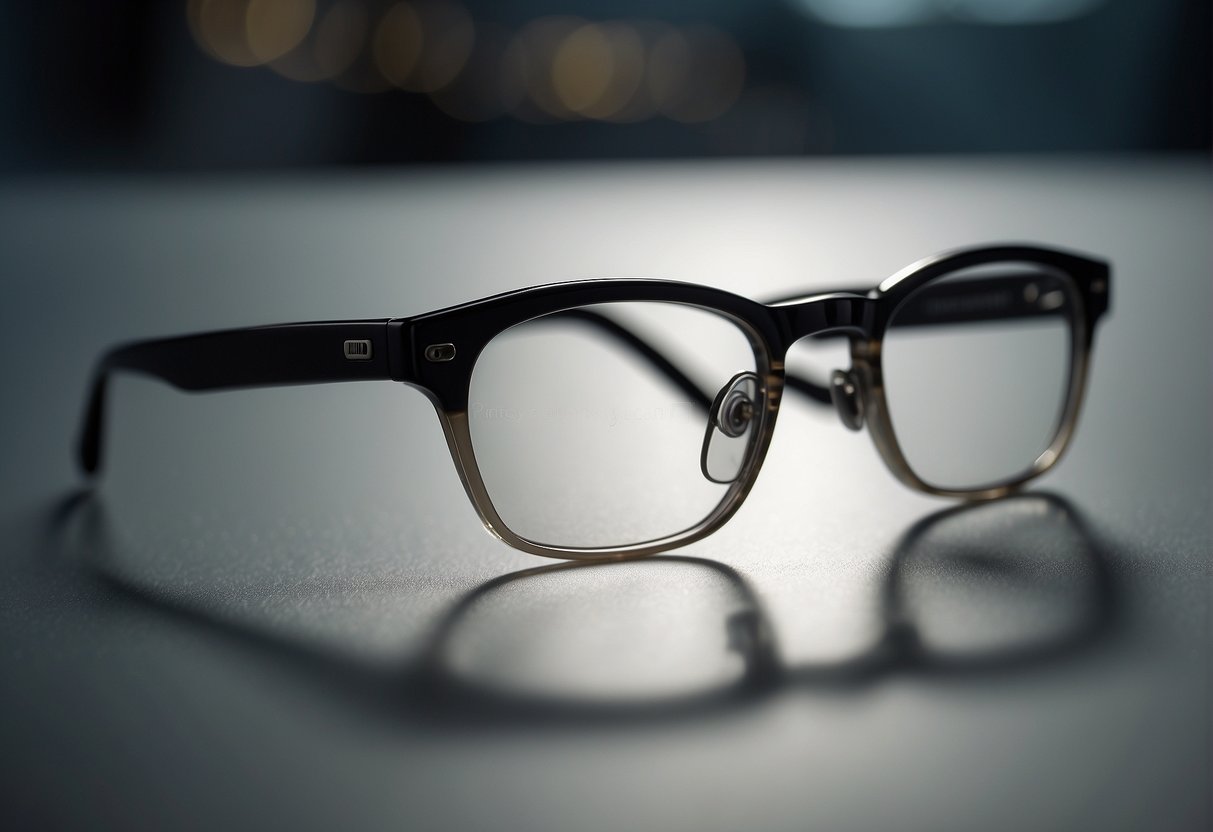
There are a few reasons our spectacles tend to slip, ranging from improper fit to the materials of the frames themselves. The good news is that there are effective strategies to keep our glasses firmly in place.
From adjusting the fit of our frames to applying specific products designed for grip, we can find solutions that work for our individual needs.
We'll explore a range of methods that can prevent our glasses from sliding down our noses. Whether it's a temporary quick fix or a more permanent solution, implementing these tactics will help to secure our glasses where they belong.
This way, we can focus less on pushing our frames back up and more on seeing the world through clear lenses.
Understanding the Problem of Slipping Glasses

We often experience the annoyance of glasses that persistently slip down our noses. This can be distracting, uncomfortable, and may affect our vision. Let's explore the factors contributing to this common problem.
Identifying the Causes of Slippage
There are several reasons why glasses might not stay put. A primary factor is the fit of the frames to our individual head and ear shapes; ill-fitting frames can lead to instability and movement.
Another cause is the material of the frames, as some materials may be more prone to sliding than others. Additionally, activities that involve movement, like sports, can increase the likelihood of glasses slipping.
Kids, with their high-energy activities and smaller facial features, may also face this issue more frequently.
Effects of Frame Design and Face Shape
Choosing the right frame design is crucial for a secure fit. Frames should complement our face shape and nose bridge size.
For instance, those with a flatter nose bridge may need frames designed to sit more securely. Conversely, certain frame styles might not work well for rounded face shapes, leading to slipping glasses.
Role of Skin Type and Activities
Our skin type plays a considerable role in keeping our glasses in place. People with oily skin or high sebum production may find their glasses slipping more often due to the grease reducing friction between the skin and the frames.
Additionally, sweat from physical activities further exacerbates the problem, causing the glasses to slide down the nose. It's important for individuals who are active or engage in sports to consider these factors when selecting frames.
When Better Fit Leads to Clearer, More Relaxed Reading
As the article explains, glasses that slide can constantly disrupt your focus, forcing your eyes and posture to work harder than they should. Frames designed with a more secure, balanced fit can help keep lenses properly positioned so your vision stays consistent during close work. The options below show how thoughtful design and fit translate into more comfortable, stay-put reading support.
Selecting the Right Glasses
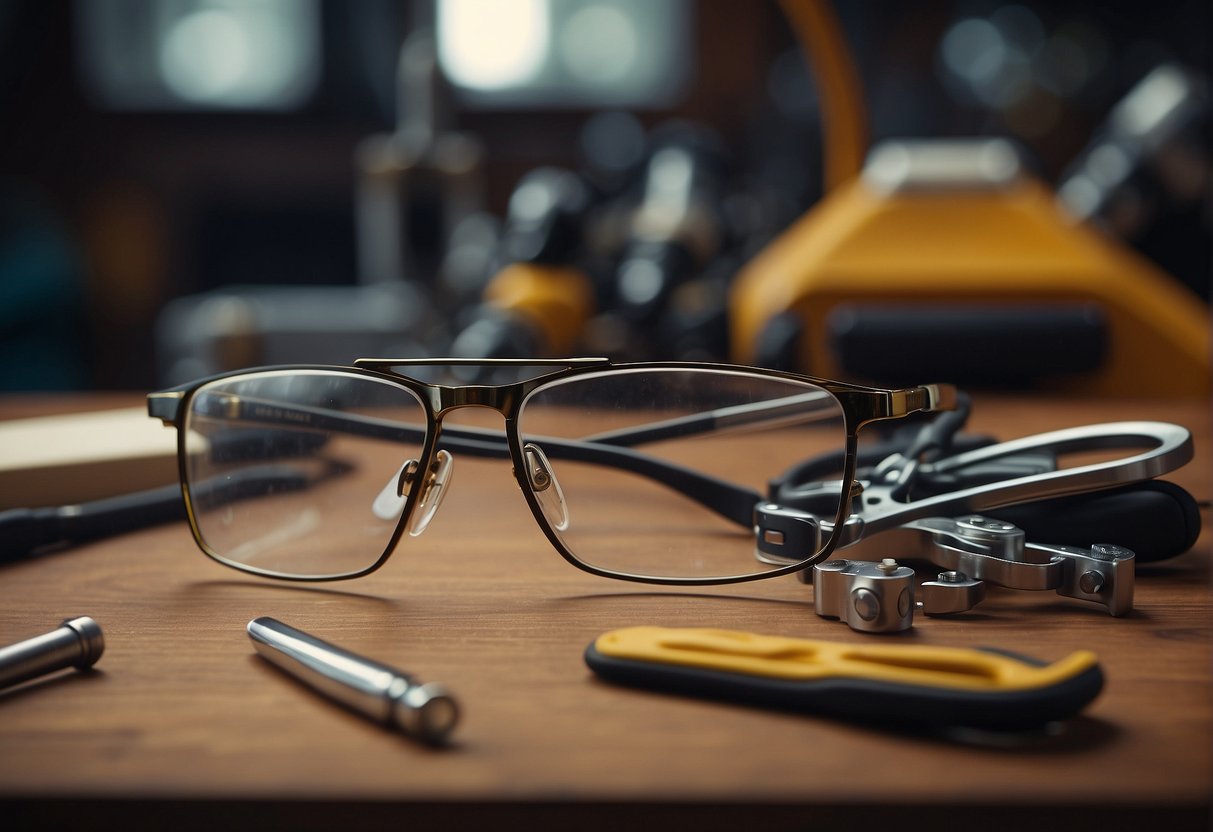
When we choose glasses, it's essential to focus on frame materials and proper sizing to prevent them from slipping down our nose.
Choosing the Proper Frames and Materials
Selecting the right frames involves considering the materials they are made from. Metal frames tend to be malleable, allowing for a snug fit, while plastic frames and those made from acetate can be lighter but less adjustable.
Frames with adjustable nose pads offer a personalized fit, as they can be tailored to the contours of our nose, ensuring a balanced position and improved comfort. Meanwhile, nose pads made of silicone often provide additional grip compared to those made of other materials.
| Material | Malleability | Adjustable Nose Pads | Weight |
|---|---|---|---|
| Metal | High | Often Present | Variable |
| Plastic | Low | Rarely Present | Light |
| Acetate | Low | Rarely Present | Light |
Importance of Correct Sizing and Adjustments
The size and fit of our glasses play a crucial role in keeping them in place. Glasses should sit comfortably on the bridge of the nose without pinching or sliding.
We must ensure that the measurements for the bridge width match our nose to prevent slipping. If our bridge is narrow, choosing a frame with a smaller bridge measurement is key. For those of us with bigger noses, wider frames may be more appropriate.
Periodic adjustments may be necessary to maintain a comfortable fit, as frames can become loose over time. Regular visits to an optician can help keep our glasses properly aligned and balanced on our face, thus enhancing our vision and comfort.
Practical Tips for Preventing Slippage
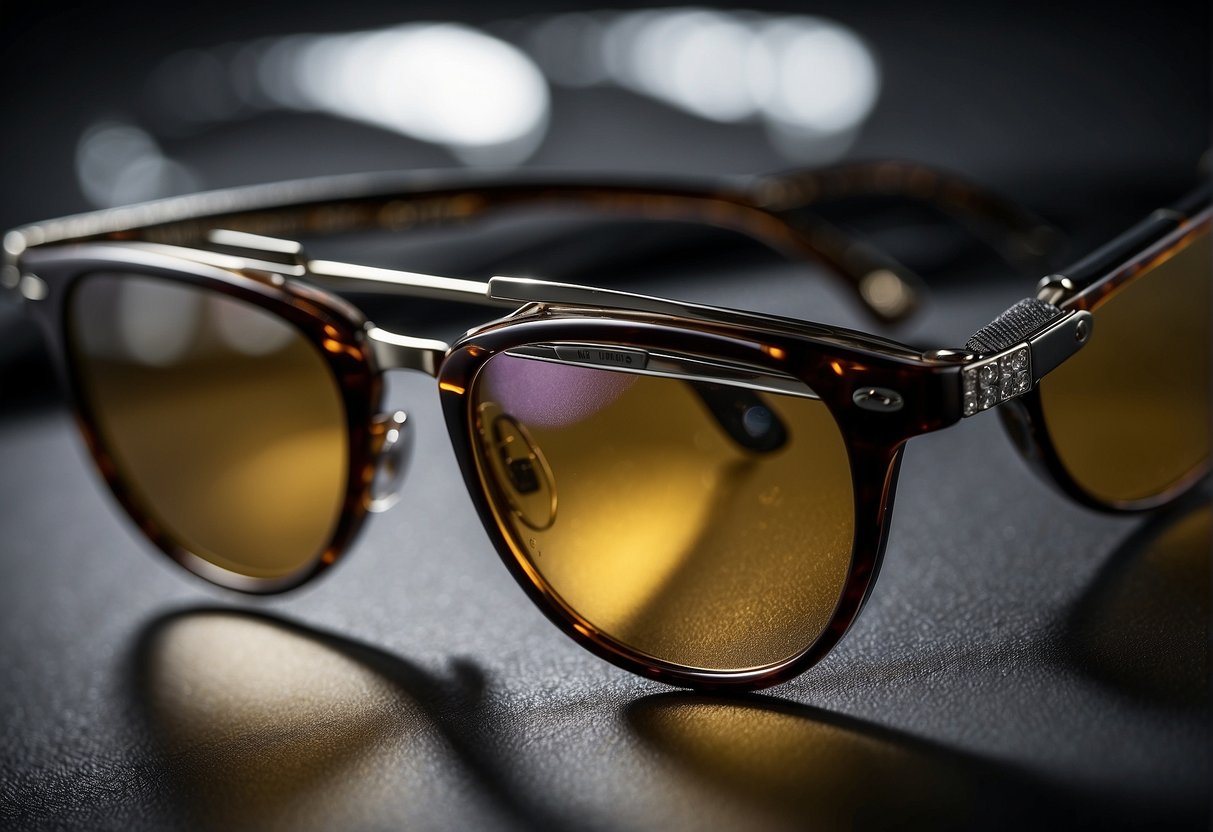
To ensure your glasses remain secure and comfortable throughout the day, we'll focus on regular maintenance, precise adjustments, and implementing supplementary accessories.
Daily Maintenance and Cleaning Routines
Maintaining a daily routine for cleaning our glasses can significantly affect their grip. Dirt, oil, and sweat can make the frames slip, so it's essential to clean them regularly.
Using a gentle cleanser or facial cleanser, we gently wash the frames and nose pads to remove buildup. We make sure to dry the glasses thoroughly with a soft, lint-free cloth to avoid smudges.
| Daily Maintenance Steps | Tools | Frequency |
|---|---|---|
| Clean frames and nose pads | Gentle cleanser, facial cleanser, lint-free cloth | Daily |
| Remove debris from hinges and screws | Soft brush or toothpick | Weekly |
Adjustment and Tightening Techniques
Over time, the screws in our glasses' hinges may loosen, causing the frames to slip. We regularly check and tighten these screws with a screwdriver from a glasses repair kit.
Moreover, if the frames feel loose, we can carefully bend the temple arms for a more snug fit at home, or seek professional adjustments for optimal comfort and security.
| Adjustment and Tightening Methods | Required Tools |
|---|---|
| Tighten screws in the hinges | Screwdriver, glasses repair kit |
| Adjust temple arms for better fit | Hands or professional service |
Advanced Solutions and Accessories
For persistent issues with slippage or for added security, we consider additional accessories.
Ear hooks or temple tips can be attached to the ends of the temples to secure the glasses behind our ears.
Another option is to apply glasses wax to the nose pads for extra grip. For active scenarios, securing our glasses with an eyewear band or using hair ties and rubber bands as a DIY solution can also be effective.
- Ear grips enhance stability and distribute weight evenly.
- Glasses wax can be applied to nose pads and temple arms for increased friction.
- Eyewear bands provide a sporty solution for intense activities.
Remember, these solutions should be comfortable and not apply excessive pressure to our ears or nose.
DIY Fixes and At-Home Solutions

We can easily improve the grip of our glasses using simple materials found at home. These methods can prevent your glasses from slipping and save the expense and time of professional adjustments.
Homemade Remedies to Increase Grip
Beeswax and Nerdwax: A common DIY solution is to apply a small amount of beeswax or a product like Nerdwax to the nose pads or the frames where they rest on the nose. This creates a wax coating that enhances friction and grip.
- How to apply:
- Clean the glasses thoroughly.
- Rub a small amount of wax onto the nose pads or frames.
- Reapply as necessary.
Silicone Nose Pads Replacement: Over time, nose pads can lose their grip. By replacing them with new silicone nose pads, we ensure better adherence to the skin.
- Steps for replacing nose pads:
- Gently remove the old nose pads.
- Align new silicone nose pads with the mount.
- Press firmly to secure them in place.
Utilizing Household Items for Quick Fixes
Adhesive Methods: Double-sided tape or a small piece of clear adhesive can provide temporary grip. Place the sticky material on the bridge or nose pads for quick slip prevention.
- Materials:
- Double-sided tape
- Clear stickers or adhesives
Hair Bands and Rubber Bands Hacks: Wrapping a small elastic band, like a section of a hair band or rubber band, around the arms of the glasses near the ears can prevent slipping.
- Method:
- Cut a small section of the band.
- Stretch and wrap it around the end of the arms.
- Adjust for comfort and grip.
When to Seek Professional Help
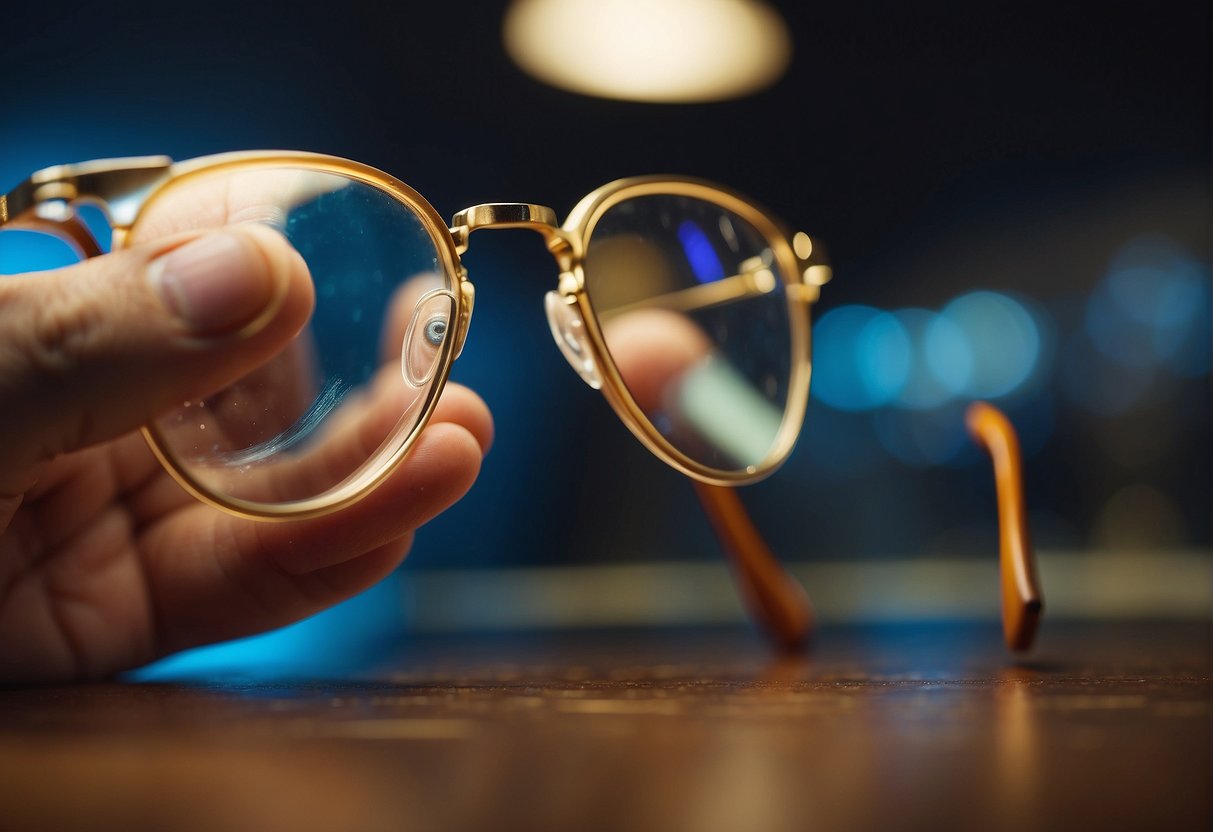
Sometimes, our efforts to keep glasses from slipping are insufficient. We might require a professional to intervene, especially when the slippage due to loose screws or bent temples is persistent.
Consulting with Opticians and Optometrists
An optician is skilled in fitting eyeglasses and making necessary adjustments. If we notice our glasses slip frequently, it could be a sign that they don't fit our face correctly. Loose screws or eyepieces are often the culprits. Opticians can tighten them accurately or replace faulty parts using a glasses repair kit.
On the other hand, optometrists also provide glasses, but they primarily focus on eye health and vision care services. If the glasses are causing heavy pressure on the bridge of our nose, this might indicate an issue with the angle or support. An optometrist can diagnose and resolve this issue.
- Optician services include:
- Adjusting bent temples
- Replacing loose screws
- Adding nose pads or grips for better support
- Optometrist services include:
- Examining eyeglass wearers for fit-related discomfort
- Prescribing changes to the weight distribution of glasses
- Assessing the frames' angle on the face
Understanding When Adjustments Need Expertise
We must split the text into at most two sentences per paragraph. Also, make sure that repetitive sentences are removed.
An optician or optometrist should be consulted if our at-home adjustments are ineffective. Attempting to adjust bent temples ourselves could potentially damage the glasses. Even simple fixes, like tightening a loose screw, require the correct tools to avoid stripping the hardware.
When specialized adjustments or repairs are needed, we consult with an optician or optometrist to ensure our glasses provide the support we need and stop slipping.
- Common indicators for professional help:
- Glasses slip despite regular at-home adjustments
- The frames feel loose or uncomfortable
- The earpieces do not rest securely against our head
Long-Term Considerations
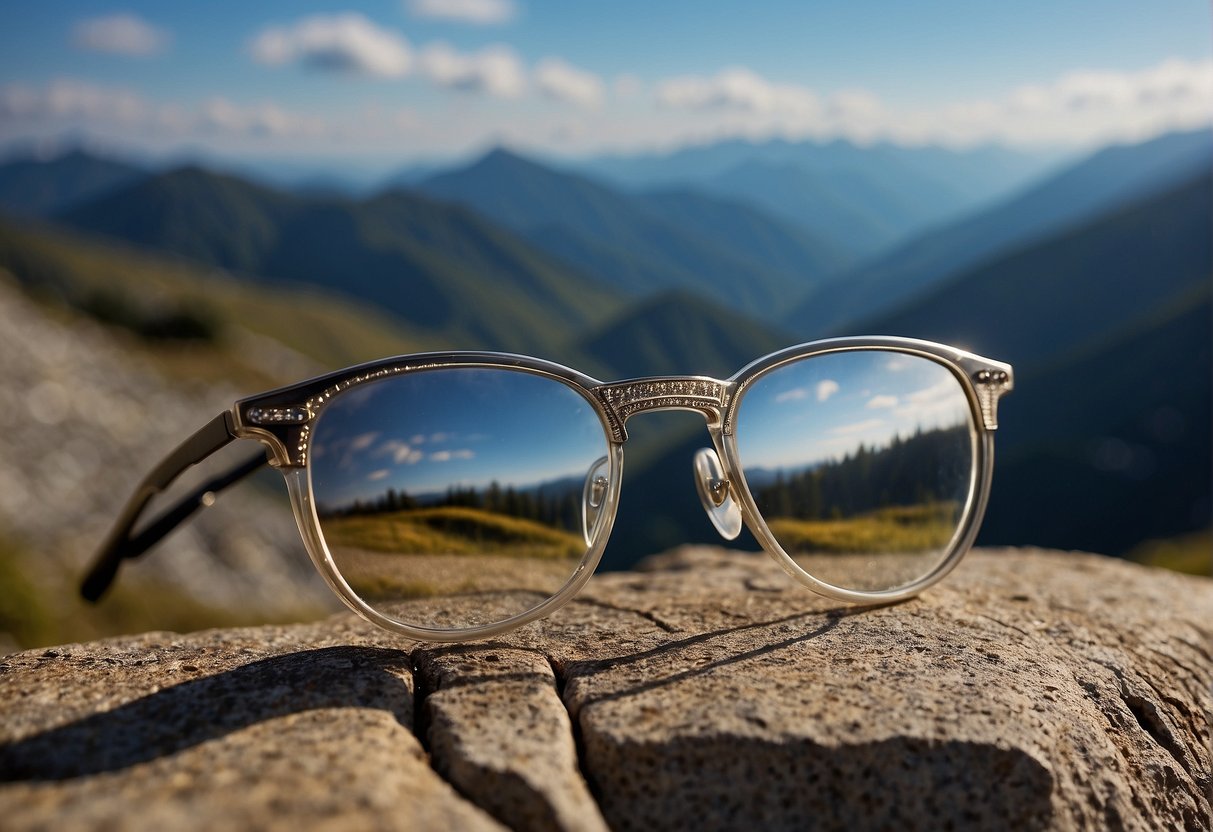
When we talk about preventing glasses from slipping, it’s essential to think about both the quality of eyewear and the daily habits that affect their performance. Making sound investments in quality frames and adjusting our lifestyle can provide lasting solutions.
Investing in Quality Eyewear for Durability
Selecting the right materials and design can make a significant difference in how well our glasses maintain their fit over time.
For example, frames made of metal may offer more durability and a longer lifespan than some plastic glasses, which are prone to stretching. Metal frames often come with adjustable nose pads that can be fine-tuned for a snug fit, reducing the likelihood of slippage.
- Choose frames with a sturdy arm design that provides adequate tension.
- Opt for glasses with nose pads that you can adjust for a personalized fit.
- Ensure that the glasses rest comfortably on a flat surface, indicating balance and even pressure distribution.
By investing in quality frames, we also minimize the frequency of needing a glasses repair kit, saving time and resources in the long run.
Lifestyle Adjustments for Better Eyewear Management
The way we manage our daily activities can also impact how securely our glasses stay put.
If you're an eyeglass wearer who spends a lot of time cooking or in environments that can cause frames to slip, certain adjustments can help.
- Maintain a good posture to keep the pressure and angle of the glasses consistent.
- Use an invisible support system, such as ear hooks or nose bridge strips, to assist in keeping glasses from slipping during active tasks.
- Avoid laying glasses down on their frames or lenses, which can cause misalignment over time.
Making these small tweaks in our lifestyle ensures that we handle our glasses with care, allowing them to keep up with our pace without sliding down our nose.
Frequently Asked Questions
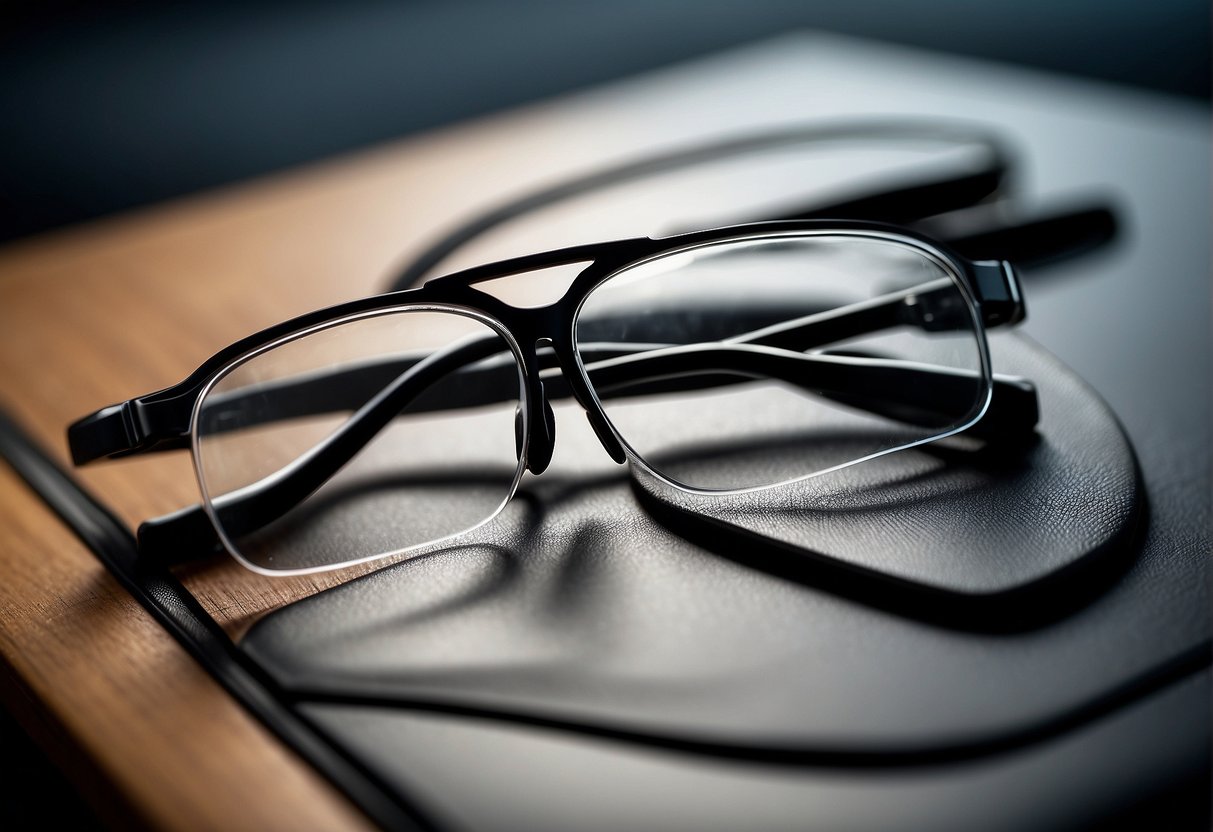
We're addressing some common concerns to help you keep your glasses comfortably in place.
What are some effective methods to prevent glasses from slipping?
To prevent glasses from slipping, we can ensure the earpieces fit snugly against the sides of the head and bend the curve of the earpiece to secure the glasses in place. Anti-slip nose pads and ear hooks also provide additional grip.
How can you adjust eyewear so it doesn't slide down when looking down?
We can adjust the nose pads so they sit flat against the nose without too much pressure, and we can tighten the screws on the arms of the glasses to improve the overall fit. Visiting an optician for a professional adjustment may also be beneficial.
What solutions work well for glasses slipping on oily skin?
For glasses slipping on oily skin, we can use anti-slip products, such as nose pad stickers or specialty sprays designed to increase friction between the skin and the glasses. Regularly cleaning both our skin and the glasses helps too.
How can one keep glasses secure while engaging in activities that cause sweating?
During sweaty activities, we can use sports bands to hold glasses firmly in place. Switching to glasses with rubber temple grips that adhere better to the skin when moist can also significantly reduce slippage.
Is it possible to attach nose pads to eyeglasses, and how does one do that?
Yes, it's possible to attach nose pads to eyeglasses. We can buy adhesive silicone pads that stick directly onto the frames, or for a more permanent solution, we can have an optician install screw-on or snap-on nose pads, depending on the frame type.
What are the best ways to tighten glasses that feel too loose?
To tighten glasses that feel too loose, carefully adjust the arms at the temples or the hinges using a pair of needle-nose pliers. Make small adjustments to avoid over-tightening or damaging the frames. If you're unsure, seek professional assistance.


